Being in debt can be stressful, especially with a low income. Many people face this common financial challenge. If you have a lot of debt, but your income needs to be increased to get out of debt, monthly debt payments can leave you constantly strapped for cash. Moreover, having too much debt can mean sacrificing your long-term future. For example, having a lot of debt can make it challenging to build an emergency fund, save for retirement, qualify for a mortgage, or obtain another line of credit. If your income is low and you are struggling to get out of debt with your current income, this article will show you how to pay off debt with a low income.
#1 Know how much you owe
First, you need to determine precisely how much you owe before finding the right way/s to tackle your debt. Start by creating a list of all your debt and then taking note of the total amount of debt you have, exactly how much you owe to each creditor, the minimum amount you need to pay each month, the interest rate of each debt, and what you are currently paying each month.
Evaluating where you currently stand financially is essential to address your debt problems.
You can get an overall picture of your debt by looking at your credit report online. You can get a free credit report from each of the three major credit reporting agencies, such as Equifax, Experian, and TransUnion. Your report will list all your debts, the amount you owe, and other information related to your debts. Another way to do this is to use a budgeting app like Mint.
Now check how much money you can pay towards your debt/s on top of the minimum monthly payment.
#2 Acquire no more new debts
One of the most crucial steps for paying off your debt is not to take on any new debts. It is essential to stop acquiring new debts if you struggle to pay off your debt and have a low income. If your monthly expenses are more significant than your monthly income, do not put the extra expenses on your credit card or do not open a personal loan to cover those expenses. Instead, you need to create a budget to live within your means. Acquiring new debts will make it easier to pay off your debt.
While taking out a personal loan with a lower interest rate or opening a new credit card with a lower interest rate to pay off your debt faster may seem like a lucrative option, it will cost a lot more if you default on your new debt payment. So, avoid taking on new debt.
However, if you want to borrow money with a lower interest rate to pay for your current debts, you should be careful of dealing with it by using the right strategy. For example, consider using a balance transfer credit card to consolidate your debts into a new loan with a lower interest rate than you currently pay. You can also consider using a consolidation loan to pay off your debts and then attempt to repay the consolidation loan if you can cope with the huge amount of interest payment that comes with it each month.
Related Posts:
- Top 10 Best Ways to Pay Off Your Holiday Debt After the New Year
- The 13 Best Ways to Pay Off Your Debt in 2024
- Crafts that Make Money: 21 Ideas to DIY Your Way Out of Debt
#3 Create a budget
A budget can help you check how much money you can pay toward your monthly debts. By creating a budget, you can compare how much of your money goes out each month to how much you earn each month. You can create a budget by buying the Mom Beach Monthly Budget Spreadsheet here!
Start by listing all your monthly outgoings, like your monthly rent or mortgage payments, utility bills, groceries, and other expenses. Then calculate your net monthly income. Next, compare your expenses to your income each month.
If you have any balance left over at the end of the month, you have a surplus budget. You could contribute this money to debt repayments to get out of debt faster. Make sure you put aside this money to pay your debt. Consider reducing your outgoings to save more money each month. You could use these savings to pay more towards your debt to get out of debt faster.
However, if you do not have any balance left over at the end of the month, consider cutting unnecessary expenses to live within your means and save as much money as possible each month. You can use the savings to work your way out of debt.
As you have seen, having a budget will keep your finances on track. It will show you where you can make changes to reduce outgoings and put these towards paying down your debt. Sticking to it will help you pay off your debt even if you are not a high earner.
#4 Cut your spending
You might need to cut your spending if you spend more than you earn monthly. If you spend less than you earn monthly, consider reducing your outgoings to advance your debt payment. If you struggle to get out of debt and are not a high-earner, you might need to cut your spending in certain areas. Start by looking at nonessential items to see if you can cut down on them or even cut out some items temporarily to find extra money to put toward your debt payments.
You can reduce your monthly outgoings and add extra money to your debt. Making some lifestyle changes temporarily can help you reduce your expenses and save money each month. Instead of buying that daily take-out coffee, you can make coffee at home or the office to save a lot of money every month.
Buy store-brand items rather than brand-name items to save money. If you live in a pricey apartment, consider moving to a less expensive place to save monthly money. Could you cook at home instead of eating out at your favorite restaurants? Are you paying for a gym membership that you rarely use or do not use? If so, then cancel your gym membership. You can exercise at home or outdoors if you want to work out. You can watch free workout videos on YouTube to learn how to work out from home.
Cancel any subscription services you are paying for but no longer using. You can switch your phone plan to another provider that offers a less expensive plan/service. You could look for free entertainment in your area, such as free concerts, instead of going to the movies or theaters. There are many more ways to cut spending.
#5 Earn more money
Earning more money is one of the best ways to pay off debt with a low income. You can do overtime at work. Another option is to ask for a raise. You can also apply for a traditional second job.
However, if picking up more hours at work is not available, or getting a raise is not possible to increase your income, then there are many other ways to make extra money thanks to the internet and the gig economy.
You can start a side hustle in your spare time to make extra money. If you have any marketable skill, you can sell your skill, primarily online, to earn extra money. For example, if you have a knack for writing, you can become an online writer to make money.
You can even make a full-time income as an online freelance writer. Depending on your skills, you can work as an:
- online tutor
- online English teacher
- freelance writer
- virtual assistant
- web designer
- graphic designer
- SEO Specialist
- digital marketer
- printable seller – Visit PLRBeach.com for a free commercial use printable to resell as your own!
There are plenty of freelance websites/marketplaces and job-specific sites to find jobs online in your area of expertise.
You can also start an online business. For example, if you are arty or crafty, you can sell your creations online using sites like Etsy, eBay, Amazon, your e-commerce website, or other places online.
You can become a part-time life coach or consultant. If you have a knack for photography, you can make money on the side as a photographer. If you are good at editing videos, you could make extra money by becoming a video editor.
If you are an animal lover, you could work as a pet sitter to make extra money or get paid to walk other people’s dogs.
Do you have a spare room? Then you could rent it out on Airbnb to make extra money. You could drive for a ridesharing company like Uber or Lyft on the weekends to make extra money. Another option is working as a delivery driver for one of the delivery services or apps like Ubereats, Grubhub, DoorDash, Instacart, etc. The options are endless.
Having more money coming in is the best way to pay off your debt faster, provided that you throw all your extra money toward your debts each month. If you put the extra money into paying off debt, you will get out of debt faster. Any extra money that you make can help you reduce your debts.
#6 Start a starter emergency fund
If you have an emergency fund, it can help you cover unexpected expenses without having to take on new debt. If you do not have one yet, focus on building a starter emergency fund before paying down your debt.
Even if you struggle to pay off your debt, you should consider saving a starter emergency fund. This is to stop accumulating further debt when you can pay cash instead of relying on your credit card to cover unexpected expenses. You should save $1,000 for a starter emergency fund.
We have shown practical ways to save monthly money and increase your income above. Put some money aside each month to build your starter emergency fund. Once you have that emergency fund in place, you can take that extra money you saved each month to build your emergency to throw at your debts.
#7 Pay more than the minimum payment
If you have multiple credit card debts and are only making the minimum payment on each, it will take years for you to get out of debt. Especially if you have accumulated debt on a credit card with a high APR and you are only making the minimum monthly payment, you will end up paying a lot of money in interest while you pay it off. It will take decades to pay off your debt this way, as you will pay very little of the principal.
However, if you pay more than the minimum payment each month, you could pay off debt sooner, as you reduce your interest costs and pay more toward the principal.
Now if you are on a low income, it might only be possible to make up to the minimum monthly payment on your credit card/s. But we have discussed in two different sections above how to save money even if you have a low income and how to increase your income so you can get as much as possible to throw at your debts.
You should put that toward your debt repayments if you have any savings. By making more than your minimum monthly payment each month, you will be able to pay off your credit card debt quickly.
#8 Pay off the highest debts first
If you have accumulated multiple debts, consider prioritizing your debt. Prioritizing debt is where you pay off one debt at a time by making more than the minimum monthly payment on that debt while continuing to make minimum payments on any other debt. It is a good idea to pay off your highest debt first. The debt is costing you the most money in interest payments each month.
If you want to pay off the debt with the highest interest rate, first, you must put more than the minimum monthly payment toward this debt while making the minimum monthly payments on all your other debts.
Once you clear this debt, you can put that extra money towards paying off the next debt with the highest interest rate. This debt repayment method is called the debt snowball method. The debt snowball method will help you save more on interest costs while paying off your debt quickly.
Click here to purchase the Debt Snowball Calculator in Google Sheets!
So, whether you have credit card debts, personal loans, and other loans you owe, start by paying off your highest debt first to work your way out of all of your debts.
Once you pay off your debt with the highest interest rate, you do not have to pay lots of interest each month towards that debt, meaning you will have more money to pay off your next debt with the higher interest rate.
#9 Negotiate a lower interest rate on your credit card/s
One way to pay off debt with low income is to reduce your credit card interest rate. If you are struggling to pay off your credit card debt/s, you should try to call your creditor/s and negotiate a lower interest rate with them.
Many credit card companies may agree to lower your current interest rate if you ask, especially if you have always made regular payments on time.
You can save money on interest payments each month if you get a reduced interest rate. You can then use those savings to pay down your debt.
If you can negotiate a lower interest rate on your current debt/s, you can pay off your debt/s faster.
#10 Build good credit
If you always make monthly payments on time and do not apply for new credit accounts, it is possible to build good credit. A good credit score can be beneficial if you are in debt because you can ask creditors to lower your interest rates.
But, if you have a low credit score, you will pay higher interest rates. If you make regular, on-time payments, keep your credit utilization at or under 30%, and do not apply for new credit accounts, you can build up your credit score over time.
Making on-time payments will help you pay off debt even if you have a low income because you will save money on interest payments, and then you can apply those savings toward debt repayments to reduce your debt quickly.
More on How to Pay Off Debt with Low Income?
It can be frustrating to find yourself in a situation where your income is low, and you struggle to pay off your debt as quickly as possible. However, do not let low income keep you from paying off your debt. As you have seen, making a budget and sticking to it, cutting nonessential expenses, acquiring no new debts, starting a side hustle, and paying off your highest-interest debt firsts are some ways to pay off debt even with a low income.
Do you have more ways on how to pay off debt with low income? Let us know in the comments!
Related Posts:
- Top 10 Best Ways to Pay Off Your Holiday Debt After the New Year
- The 13 Best Ways to Pay Off Your Debt in 2024
- Crafts that Make Money: 21 Ideas to DIY Your Way Out of Debt
Pin to Pinterest:
Pin to Pinterest so other moms can find out how to pay off debt with low income too!
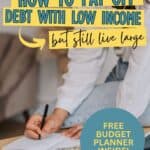
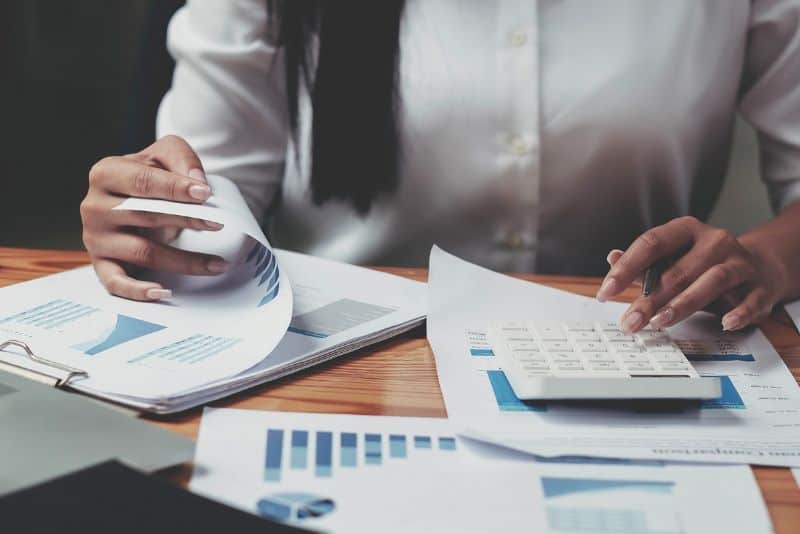


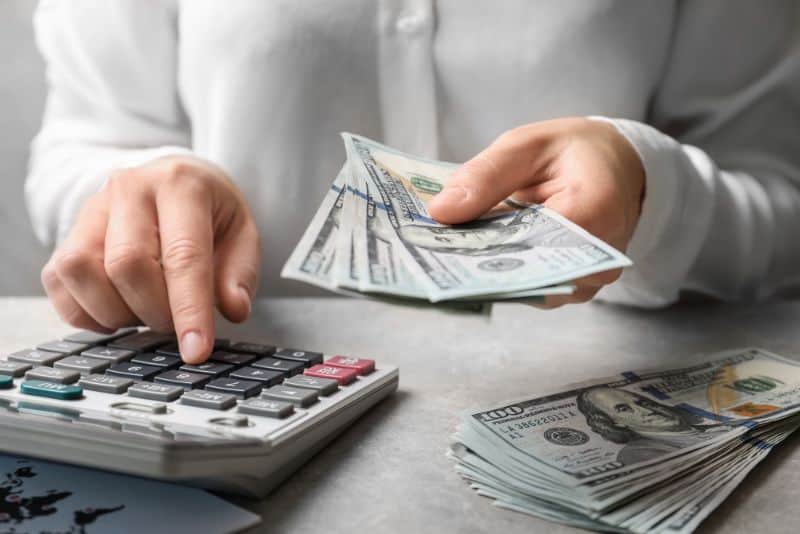

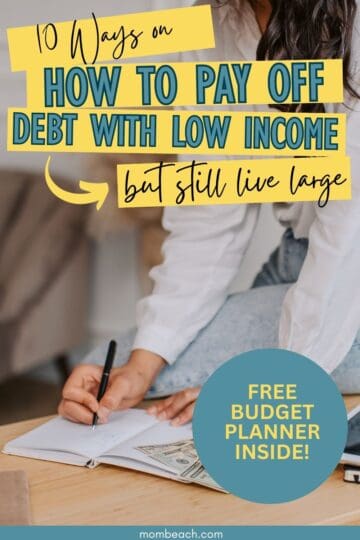

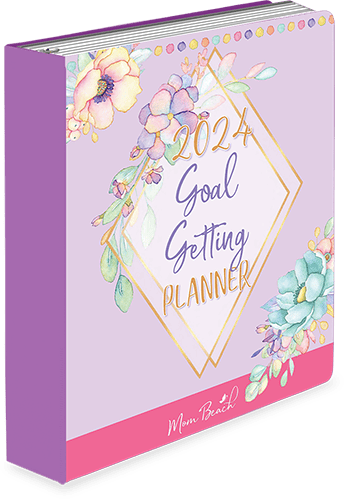
Leave a Reply